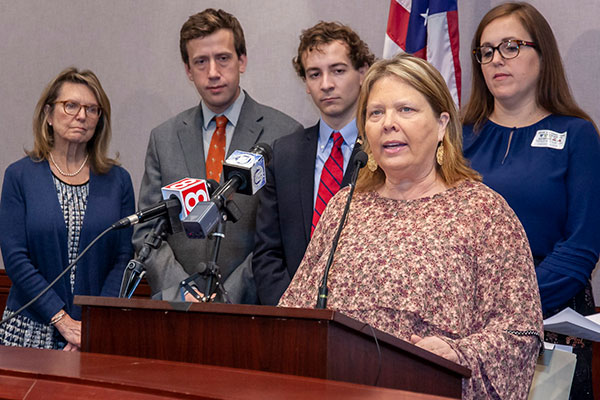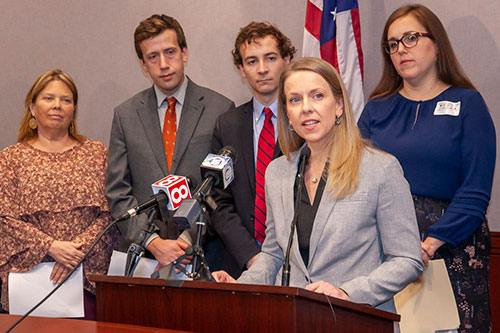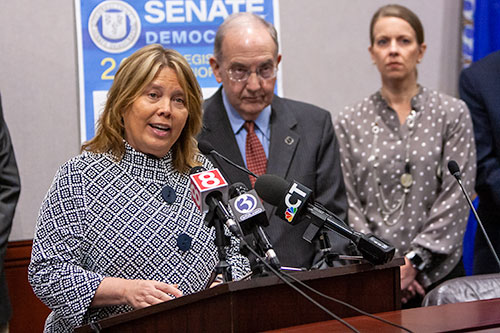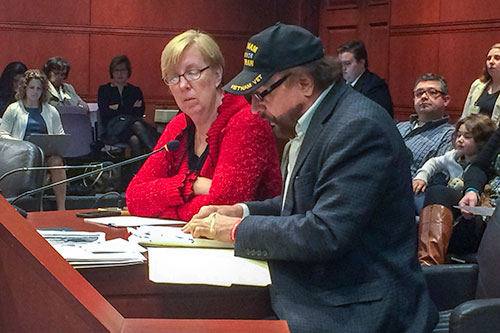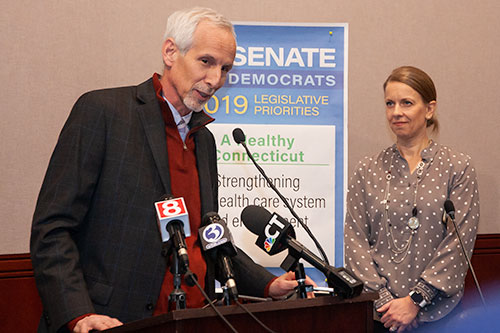Senator Haskell, Senate Democrats Announce “A Connecticut For All” Agenda
Bill proposals aim to strengthen gender equality

Today, State Senator Will Haskell (D-Wilton) and the Senate Democrats announced “A Connecticut for All,” the fourth of four legislative agendas for the 2019 legislative session. The series of bills outline the policy proposals from Senate Democrats to strengthen gender equity and build a state for all our residents.
Sen. Haskell discussed “Senate Bill 533: An Act Concerning Expanding Access to Diaper Changing Tables” during the announcement.
“What this bill would do is improve the health and safety of children,” said Sen. Haskell, “by requiring all new and substantially renovated buildings that have public restrooms to provide at least one diaper changing table to women and, importantly, also men on each floor that’s accessible to the public. The reason behind this bill is the fact that parenting finally is, in the 21st century, becoming more equitable. Mothers and fathers are starting to share responsibilities in a more fair manner.”
“Diaper changing tables are found, typically, only in women’s restrooms,” Sen. Haskell said, “which makes it inconvenient for fathers out in the public, or alone, or same-sex male couples, to provide for the health and safety of their child, forcing these men to either change their child on unsanitary restroom floors or counters or even delay changing the diaper, which can lead to rashes and infections for the child. This bill sends a message to young families who are deciding where to buy their home, where to send their kids to school, that Connecticut is a wonderful place to raise your children. It’s a healthy, safe and equitable place to raise your children.”
Additional legislative proposals in the “A Connecticut for All” agenda introduced and supported by Sen. Haskell include:
Senate Bill 3: Time’s Up Act: An Act Concerning Sexual Assault and Sexual Harassment
“When sexual assault and sexual harassment are still all too common, with new stories continuing to shock and horrify the public—and many more stories going unheard, with those victims unable to receive the help and support they so desperately need—we owe it to everyone in Connecticut to do whatever we can to strengthen our laws,” said Sen. Haskell. “By extending the statute of limitations for sexual assault crimes and continuing to emphasize the importance of sexual harassment prevention, we protect the victims who all too commonly are silenced by their employers, their bosses, their abusers.”
Senate Bill 697: An Act Concerning Nondisclosure Agreements in the Workplace
Senate Bill 761: An Act Concerning Honest Recommendations in the Workforce
“These bills would remove two shields and would hold individuals, and employers acting in bad faith, accountable for their actions,” said Sen. Haskell. By banning NDA settlements in the event of sexual harassment or sexual assault, as well as making employers responsible to take their employees’ actions seriously by punishing those who pass their problematic employees to other companies, we can strike back against these pervasive issues.”
Senate Bill 765: An Act Concerning Equal Pay
“Equal work requires equal pay, and yet women on average still earn about 20 percent less than men for the same work,” said Sen. Haskell. “By reviewing our state laws and finding better ways to ensure this gap can be shortened, we’ll make a fairer playing field for the workers of Connecticut.”
Senate Bill 395: An Act Concerning Deceptive Advertising Practices of Limited Services Pregnancy
“If you need medical care, especially important, immediate care like for a woman needing reproductive healthcare, you shouldn’t be led astray by someone who doesn’t even have licensed medical staff available, and yet that’s what crisis pregnancy centers do,” said Sen. Haskell. “By requiring these businesses to stop using deceptive advertising, we can ensure women needing help receive that help without being lied to.”
This bill would ban false and deceptive advertising practices and require all providers to offer information regarding how to access comprehensive reproductive health care upon request. In addition, the bill would require crisis pregnancy centers to disclose to individuals seeking health care that they do not have licensed medical providers on staff.
Senate Bill 394: An Act Concerning CT protecting women from unfair health and wellness mandates
“The federal government is showing that it wants to restrict women’s access to healthcare, especially with the escalating battles over long-decided issues like Roe v. Wade,” said Sen. Haskell. “In the face of this, we need to establish a council that protects Connecticut’s women from losing their rights, and this legislation would do just that.”
This bill would establish the Council on Protecting Women’s Health. The Council will be tasked specifically with monitoring federal legislation, proposed administrative rules and the progress of litigation relating to women’s health and wellness ensure that the actions of the federal government will not be thwarting women’s health care here in Connecticut.
Senate Bill 792: An Act Concerning Discrimination
“While we all deserve to feel equal and valid in our own skin, as the person we choose to be, too many people, especially transgender people, are not offered that by our society,” said Sen. Haskell. “We need to fight discrimination and ensure we’re all given the right to feel comfortable as ourselves, not bullied and belittled by others.”
This bill would establish a task force to consider what state laws may be necessary to strengthen protections against transgender discrimination in our schools and workplaces.
